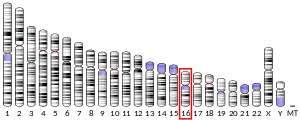IRX5
Iroquois-class homeodomain protein IRX-5, also known as Iroquois homeobox protein 5, is a protein that in humans is encoded by the IRX5 gene.[3][4]
Function
IRX5 is a member of the Iroquois homeobox gene family. Members of this family appear to play multiple roles during pattern formation of vertebrate embryos.[3] First described in a 2012 study by Reversade and colleagues, the loss of IRX5 in humans causes Hamamy Syndrome, a recessive developmental disorder mainly affecting the heart, long bones, and craniofacial structures. [5]
References
- GRCh38: Ensembl release 89: ENSG00000176842 - Ensembl, May 2017
- "Human PubMed Reference:". National Center for Biotechnology Information, U.S. National Library of Medicine.
- "Entrez Gene: iroquois homeobox 1".
- Ogura K, Matsumoto K, Kuroiwa A, Isobe T, Otoguro T, Jurecic V, et al. (2001). "Cloning and chromosome mapping of human and chicken Iroquois (IRX) genes". Cytogenetics and Cell Genetics. 92 (3–4): 320–5. doi:10.1159/000056921. PMID 11435706. S2CID 46509502.
- Bonnard C, Strobl AC, Shboul M, Lee H, Merriman B, Nelson SF, et al. (May 2012). "Mutations in IRX5 impair craniofacial development and germ cell migration via SDF1". Nature Genetics. 44 (6): 709–13. doi:10.1038/ng.2259. PMID 22581230. S2CID 5535474.
Further reading
- Lewis MT, Ross S, Strickland PA, Snyder CJ, Daniel CW (June 1999). "Regulated expression patterns of IRX-2, an Iroquois-class homeobox gene, in the human breast". Cell and Tissue Research. 296 (3): 549–54. doi:10.1007/s004410051316. PMID 10370142. S2CID 37046813.
- Bruneau BG (March 2006). "[Irx5: a transcription factor that regulates the cardiac repolarization gradient]". Médecine/Sciences. 22 (3): 231–2. doi:10.1051/medsci/2006223231. PMID 16527195.
- Myrthue A, Rademacher BL, Pittsenbarger J, Kutyba-Brooks B, Gantner M, Qian DZ, Beer TM (June 2008). "The iroquois homeobox gene 5 is regulated by 1,25-dihydroxyvitamin D3 in human prostate cancer and regulates apoptosis and the cell cycle in LNCaP prostate cancer cells". Clinical Cancer Research. 14 (11): 3562–70. doi:10.1158/1078-0432.CCR-07-4649. PMID 18519790.
- Kanno S, Kuzuoka H, Sasao S, Hong Z, Lan L, Nakajima S, Yasui A (April 2007). "A novel human AP endonuclease with conserved zinc-finger-like motifs involved in DNA strand break responses". The EMBO Journal. 26 (8): 2094–103. doi:10.1038/sj.emboj.7601663. PMC 1852789. PMID 17396150.
External links
- IRX5 human gene location in the UCSC Genome Browser.
- IRX5 human gene details in the UCSC Genome Browser.
This article incorporates text from the United States National Library of Medicine, which is in the public domain.
This article is issued from Wikipedia. The text is licensed under Creative Commons - Attribution - Sharealike. Additional terms may apply for the media files.

